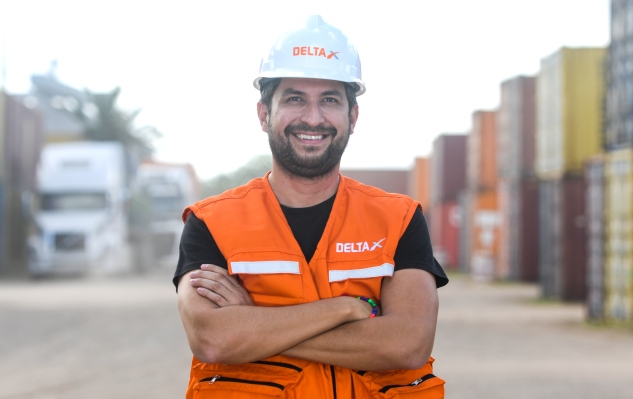Transportation startup DeltaX is accelerating its plans to digitize the trucking industry in its native Bolivia and beyond thanks to a recent $1 million seed round.
DeltaX operates in the same space as Convoy, Loadsmart and Sennder – freight forwarding (plainly, helping companies move goods from point A to point B). But the startup focuses on a region of Latin America where trucking is still in dire need of a digital transformation, unlike other countries where this transition has already begun and accelerated amid the pandemic.
“We are working to solve a huge logistics problem in the Andean region,” DeltaX CEO Luis Fernando Ortiz said. “Over-the-road transportation in this economic zone is inefficient and expensive, which has enormous implications for the competitiveness of our countries and the well-being of our truck drivers.”
Millions of tons of cargo are transported each year via the Pan-American Highway and its branches across Colombia, Ecuador, Peru, Chile, Bolivia and Paraguay. The cargo includes commodities, such as minerals from the Lithium Triangle and beyond; grain, fruit and vegetables, as well as containerized imports. But the process is deficient, and it is drivers who pay the toll.
There are around 1 million truck drivers in the region, most of them independent, Ortiz said. In its current form, this fragmentation has many downsides, which DeltaX is hoping to address through technology.
There are several layers to DeltaX’s activities: It facilitates communication between parties, automates cargo tracking and reporting, and adds visibility to shipment documentation, with upcoming elements of fintech and machine learning.
“Everyone in our sector follows this model, but we are going to be the first ones to apply it to our region,” Ortiz said.
Adapting to Latin America
Digitization is undeniably a shared need around the world for logistics, a sector that until recently largely operated on phone calls, printouts and faxes. But while this has started to change in many countries, Bolivia still lagged behind.
Ortiz knew this problem firsthand: He used to work for the Chilean port of Arica, a major hub for the region. There, he co-founded a club for truck drivers, most of whom came from neighboring countries and needed more support. This is how he knows that they typically spend 25 days in a row on the road away from their families — and the harm that a lack of work predictability causes to their quality of life.
Thanks to a Fulbright scholarship, Ortiz went on to study in the U.S., obtaining a master’s degree in Business Administration from Babson and an M.A. of Public Administration from Harvard. Now that he has moved back to Bolivia, both are proving relevant to his new endeavor, where business acumen matters perhaps just as much as an understanding of regulation and of the social context of the drivers.
Understanding the needs of drivers has deeply shaped DeltaX’s technology. When it first launched in February 2020, it was a mobile application for truck drivers. Mobile still plays a key role in its strategy, as does WhatsApp, with bots providing answers to frequent questions on the go.
Better serving the 1,300 drivers affiliated with DeltaX is also why the startup is planning to add an embedded fintech element to its platform, as is now common among Latin American startups. It would take the form of a microcredit lending program for working capital – providing advances on upcoming revenue.
“Truck drivers are underbanked because their income isn’t stable; that’s why the fintech side is important to us,” Ortiz said.
DeltaX also hopes that algorithms will be able to improve its prediction abilities, and therefore the working conditions of drivers. Instead of having to pay intermediaries and not being sure they’ll secure work, Ortiz explained, “A driver can say: I’m staying home this weekend because I know I have a journey planned for Monday.”
Hiring the data scientists who can make this happen is one of the ways DeltaX plans to use the proceeds of its seed round. With a current team of 23, it also plans to add UX experts, software engineers and product managers to keep on improving its platform.
Neighbors helping neighbors
DeltaX’s seed round was backed by several funds from the U.S. and Latin America: Magma Partners, out of Chile, which led the round; Duro Ventures, from California; 99 Startups, from Mexico; and Cibersons, from Paraguay. Bolivian angel network SC Angeles, which Ortiz co-founded, also participated.
While these names carry quite a bit of weight, as does the fact that DeltaX participated in the Harvard Alumni Entrepreneurs Accelerator, the profile of some of its individual backers is also worth noting. Indeed, several of them have high-level roles in Latin America’s transportation sector, including two startup founders: Nowports CEO Alfonso de los Rios and Nuvocargo CEO Deepak Chhugani.
Ortiz said that DeltaX is complementary to these startups because of its geographic focus and the subverticals it is concentrating on. A key aspect is its exclusive focus on over-the-ground transportation, which is tied to a sore point in Bolivia’s history: The country is landlocked, having lost access to the sea in 1884 after a war with Chile.
DeltaX’s fundraising event is an important milestone for Bolivia’s startup scene: It is one of the country’s largest venture capital rounds to date. This shows that the ecosystem is still nascent, but also confirms the progress it has been making over the last few years.
Recent exits include NetComidas’ acquisition by PedidosYa and Venezuelan super app company Yummy buying up Yaigo.
But Bolivia isn’t just fodder for expansion-oriented M&As: It also has startups with regional ambitions, such as TuGerente and Ultra. DeltaX is one of these; in the coming months, it plans to open offices in neighboring countries to expand its operations, starting with Peru.
In the longer term, DeltaX hopes to further expand to Chile, Colombia, Ecuador and Paraguay, Ortiz told TechCrunch. Will there be more consolidation in Latin America’s transportation sector in the meantime? It will be interesting to watch.
Credit: Source link


Comments are closed.